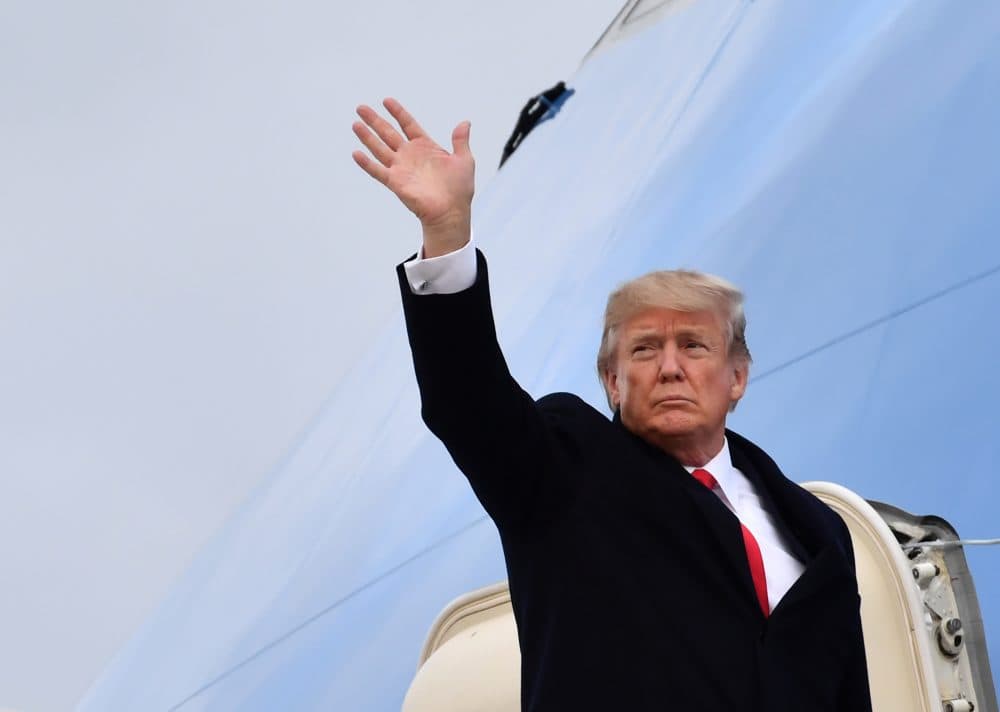Advertisement
President Trump's Policies Mark 'Return To Realist Principles,' Scholar Says

President Trump delivers his first State of the Union address Tuesday night. The White House says he'll focus on jobs, the economy, immigration and national security.
Here & Now's Jeremy Hobson speaks with Ohio State University professor Randall Schweller, who believes Trump's first year in office has been a success.
Interview Highlights
On how President Trump has done in his first year
"Very well. I'm very happy with it. There might be a couple of things that I would do differently, but I think, on the whole, he's following through on his campaign promises."
On what Trump should do differently
"I think ramping up Afghanistan, putting more troops in Afghanistan doesn't seem wise to me, but then I'm not privy to all of the information that the military has. But I think this is something that we should try to get out of.
"I think he's just listening to the generals. You know, if you look at his cabinet, and he has a great deal of respect for the military and doesn't like too much civilian intervention.
"I guess he could stop tweeting so much. That's probably the most important thing."
"If I had to say what the spirit of Trumpism is, it would be kind of a return to realist principles of, you do things when they’re in the national interest, narrowly defined."
Ohio State University professor Randall Schweller
On the "spirit of Trumpism"
"There is no Trump doctrine yet. I don't even think there was an Obama doctrine, and those kind of things usually come late in the president's term. But if I had to say what the spirit of Trumpism is, it would be kind of a return to realist principles, of you do things when they're in the national interest, narrowly defined. And you weigh all of your agreements and treaty obligations and commitments according to — and that includes trade agreements, particularly — according to how well they affect America's interests and how will they affect the American people, which after all, the government has to serve the American people."
On the tariffs on solar panels and washing machines coming out of China
"You've mentioned one of the other things that I'm not thrilled about, but I am not in principle against tariffs if it will level the playing field or if you use them as bargaining chips to get fair trade. We all want free trade, but, as it stands, the United States is running trade deficits of almost $48 billion a month, much of it with China and Mexico. And so, we have to do something to get fair trade, because I do not believe that if we had the same kind of access to their markets as they have to our markets, that you would see these incredibly large trade deficits that have been persistent for many, many, many years."
On why Trump wants to renegotiate NAFTA
"I think it's because it wasn't fair to the U.S., and NAFTA has been great for creating a Mexican middle class, just like our deals with China. But it's done very little for American middle class and American workers. And so we like free trade but we're running $300 billion worth of deficits with Mexico every year, and I don't think that that's a good thing for Americans."
On the U.S. fight against ISIS
"I think he's winning in the fight against ISIS, which is a good thing. And I mean even The New York Times had to say, you know, if anyone had predicted that ISIS would hold virtually no territory at all a year after Trump was elected — that's a huge accomplishment, a huge achievement. And yet, you know, it rarely makes the mainstream media. You don't see CNN talking about it. You don't see MSNBC, you don't see NBC. They talk about a fake Russia collusion scandal 24/7."
On Russian meddling in the election
"So why is it fake? Well, let's do a counterfactual. Imagine that Hillary Clinton had won the election. Do you think we would talk about Russian collusion or Russian meddling in our election for a year and a half, virtually, 24/7. Would that be what CNN's sole narrative would be? MSNBC, The New York Times, The Wall Street Journal — they would barely be talking about it because they'd know that it had nothing to do with the election. And they didn't overturn one precinct. The question, the counterfactual: Would we be talking about this if Hillary had won? No. I mean, do you honestly think that we would be talking about Russia 24/7, Russia collusion, if Hillary Clinton had won the election?
"I'm saying Russia had zero effect on the American election. I'm not saying they didn't try to do things. I'm just saying they had no effect whatsoever. We do things all the time in other people's elections. If they had actually affected ballot boxes, OK, that's an issue. But that's not what happened. So if Hillary had won, we wouldn't be talking about this."
This article was originally published on January 29, 2018.
This segment aired on January 29, 2018.